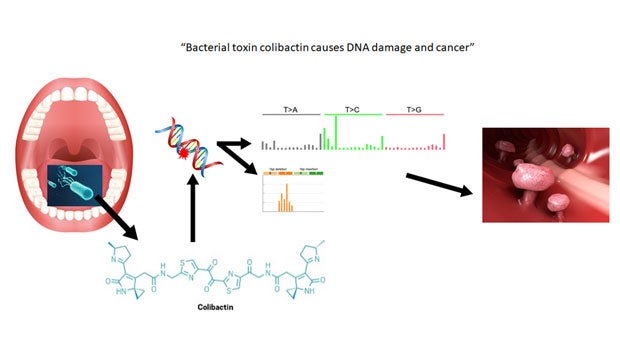
• Colibactin, a toxin produced by bacteria that often live in the gut, is linked to some cancer mutations.
Reports show that cancer is the second leading cause of death globally. Scientists from Duke-NUS Medical School have found DNA mutations in some cancers that link them to a bacterial toxin called colibactin. Their findings, published in the journals Gastroenterology and Genome Research, improve understanding of how some cancers develop, and could help in their prevention.
Studying DNA mutations in cancers can help clarify how cancers develop and what makes cancer cells different from normal, healthy cells. The team of scientists from Duke-NUS’ Cancer and Stem Cell Biology (CSCB) programme, specifically wanted to look more closely at Asian cancers to expand the list of 65 currently known mutation patterns found in cancers. Scientists expect there are still some rare mutation patterns that have yet to be discovered.
The researchers examined 872 colorectal lesions from 201 patients with unexplained, non-inherited polyposis. This condition involves the formation of intestinal polyps that can predispose people to cancer. It is usually caused by a mutation in the Adenomatous polyposis coli (APC) gene. This gene is critical for several cellular processes and acts as a tumour suppressor by preventing cells from growing and dividing uncontrollably. The team found that almost 20 per cent of the patients had tumors with mutations in the APC gene with characteristics similar to those caused by a bacterial toxin known as colibactin, suggesting the toxin’s involvement in initiating polyp formation in these individuals.
This study was built upon an earlier study where the team analysed DNA mutations in 36 Asian patients who were treated in Singapore for a mouth cancer called oral squamous cell carcinoma. “We found a very specific pattern of DNA mutations in the oral cancer of patients who also had severe bacterial infection in their mouth. We found that these DNA mutations had been caused by a toxin called colibactin, which is produced by these bacteria,” said Dr Arnoud Boot, Senior Research Fellow at the CSCB programme and the lead author of this study.
Colibactin, is produced by a specific group of Escherichia coli bacteria, which normally live in the gut. While exposure to colibactin is difficult to prevent, the research team suggests that regular brushing of teeth might have prevented the bacterial infection that appears to have triggered the cancer-causing DNA mutation in the oral cancer patient who was examined.
“There are bacteria that sometimes live in the human body, making a toxin that contributes to cancer formation. In addition to understanding what causes cancer, our results also indicate that some cancers that are caused by colibactin might be preventable,” said Professor Steve Rozen from Duke-NUS’ CSCB programme, who is the corresponding author of one of these studies.
“These kinds of investigations by our researchers from the CSCB programme are crucial in better understanding how to prevent cancer by targeting cancer-specific changes,” said Prof Patrick Casey, Senior Vice Dean for Research at Duke-NUS.
The team next aims to analyse a larger dataset of cancers that could be associated with colibactin.
References:
1. Arnoud Boot, Alvin W.T. Ng, Fui Teen Chong, Szu-Chi Ho, Willie Yu, Daniel S.W. Tan,N. Gopalakrishna Iyer and Steven G. Rozen. Characterization of colibactin-associated mutational signature in an Asian oral squamous cell carcinoma and in other mucosal tumor types (2020). Genome Research.
2. D. Terlouw, M. Suerink, A. Boot, T. van Wezel, M. Nielsen and H. Morreau. Recurrent APC splice variant c.835-8A>G in patients with unexplained colorectal polyposis fulfilling the colibactin mutational signature (2020). Gastroenterology.
Complete research papers available at this links:
https://genome.cshlp.org/content/early/2020/07/02/gr.255620.119.abstract
https://www.sciencedirect.com/science/article/pii/S0016508520348599













 Get it on Google Play
Get it on Google Play